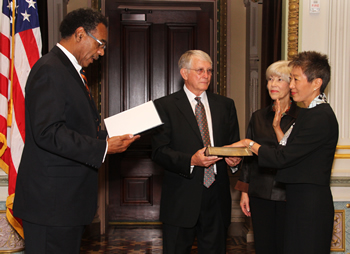EC from DC - July 25, 2014
 |
What a great week for Missouri's local leaders. Our community benefits from and is blessed with a plethora of promising people. This week, two of them came to Washington to embark on new roles.
On Wednesday, I had the honor of swearing in Dr. Jane Chu as the 11th Chairman of the National Endowment for the Arts. Dr. Chu has served our community with distinction and devotion for many years, and her hard work, talent, and passion for culture, education, and the arts make her uniquely qualified for this position. I truly cannot wait to see what she does, and how she does it, in this role.
Since 2006, Dr. Chu served as the President and CEO of the Kauffman Center for the Performing Arts in Kansas City. She has also served in various capacities at the Kauffman Fund for Kansas City, Union Station, the Greater Kansas City Community Foundation and the Greater Kansas City Chamber of Commerce. She was bestowed the honor of Kansas City's Nonprofit Professional of the Year for 2014. Chu is also an avid pianist. She was born in Shawnee, Oklahoma, but was raised in Arkadelphia, Arkansas, the daughter of Chinese immigrants. She studied music growing up, eventually receiving bachelor's degrees in piano performance and music education from Ouachita Baptist University and master's degrees in music and piano pedagogy from Southern Methodist University. Additionally, Chu holds a master's degree in business administration from Rockhurst University and a PhD in philanthropic studies from Indiana University, as well as an honorary doctorate in music from the University of Missouri-Kansas City Conservatory of Music and Dance.
The National Endowment for the Arts was established by Congress in 1965 as an independent agency of the federal government. To date, the NEA has awarded more than $5 billion to support artistic excellence, creativity, and innovation for the benefit of individuals and communities. The NEA extends its work through partnerships with state arts agencies, local leaders, other federal agencies, and the philanthropic sector.
Another leader is Stephen R. Bough. On Thursday, he was confirmed as a United States District Judge for the Western District of Missouri. Steve grew up in Republic, Missouri and attended Southwest Missouri State University (now Missouri State University), where he met his wife, Andrea. After completing law school at the University of Missouri – Kansas City, where he served as the Editor-in-Chief of the UMKC Law Review, Steve served as a law clerk to United States District Court Judge Scott O. Wright. Steve has been an award-winning attorney for years now, as well as an adjunct professor, an active member of the community, and an advocate for justice.
Join me in congratulating these movers and shakers. And look around—the next leader could be in your backyard—or could be you!
 |
I doubt there is anyone who does not have a loved one, a friend, a coworker, or a family member that suffers from a chronic illness. I remember when my cousin, who suffered from stomach cancer, told me she wanted more palliative care options. As a minister, I have dedicated much of my life to counseling those in their time of need. When illness strikes, a strong and stable support network plays a great role in recovery.
This week, I spoke to advocates for palliative care. As you may know, palliative care is the coordination of care among a variety of health care providers – from psychologists to occupational therapists to spiritual leaders – working together with the shared goal of helping a patient recover by explaining treatment options, managing pain, and improving quality of life. A recent report by the American Heart Association and American Stroke Association found that stroke patients should have access to customized palliative care. With nearly 800,000 Americans suffering from strokes annually, providing patients with coordinated palliative care teams will help stroke patients and their families to further improve quality of life and move forward towards recovery.
Last year I introduced H.R. 1666, the Patient Centered Quality Care for Life Act. I am pleased Alabama's Republican Congressman Spencer Bachus is co-sponsoring this bill with me. We are gaining traction and I am hopeful we can pass this bill, and help those who need it. It can be a very confusing and emotionally exhausting time for loved ones as they try to care for chronically ill family members. Unfortunately, right now, those who need to focus on fighting their illness must also battle a deluge of confusing information, duplicative tests and multiple doctors. Palliative care provides patients with a team of trained professionals to help them address their care and improve their quality of life.
Palliative care is one of the fastest growing trends in health care, giving patients added support with specialists who can help navigate the medical landscape. Removing unnecessary stress and coordinating care for both the patient and the patient's family are top priorities of this legislation.
My bill would:
- Authorize a National Patient-Centered Care and Quality of Life Stakeholder Strategic Summit to analyze and identify strategies for improving the quality of life for the rapidly growing population of patients facing serious illness.
- Establish a Quality of Life Patient and Professional Awareness Initiative to educate patients about the health advantages of receiving patient centered palliative care and the services it provides.
- Establish a professional workforce initiative to train allied health professionals including nurses, nursing assistants, social workers and patient navigators to enhance symptom assessment and management, communications skills, coordinated care, and other quality of life focused treatment for all clinical specialties.
This week marks the anniversary of the Dodd-Frank Wall Street Reform and Consumer Protection Act of 2010. In the House Committee on Financial Services, of which I am a member, we had a hearing to review the law, four years out. The hearing was filled with impassioned testimony and important exchanges, as we looked back to the financial crisis—really a financial cataclysm—that led us to work for reform. After the worst of the crisis subsided, it became clear that a massive reform of our nation's financial system was necessary to reset the economy and prevent a future crisis. Dodd-Frank accomplished that goal: providing accountability, transparency, and creating a stable financial system essential to grow the economy and create jobs.
Dodd-Frank changed the way consumers, investors and other market participants interact with our financial system. It has provided oversight to Wall Street, given regulators the tools to end the era of "too big to fail" entities and taxpayer bailouts, and has eliminated loopholes that allowed risky and abusive practices to go unnoticed and unregulated. While reining in the risky activities of the largest Wall Street banks that caused the 2008 financial crisis, the law also minimized the regulatory burdens on community financial institutions and took steps to support job creation at small businesses. However, there is still work to be done to make sure these regulatory burdens do not bear down on community banks. They did not cause our crisis and they should not be unfairly harmed by the cure.
Dodd-Frank has restored responsibility and accountability to our financial system – and given Americans confidence that there is a system in place that works for and protects them. It does so by accomplishing the following objectives:
- Protecting consumers from the unfair and deceptive practices and products that led to the 2008 crisis;
- Giving regulators the tools to ensure that no Wall Street firm grows too large, complex, or risky so as to threaten the global economy;
- Creating transparency in previously opaque and complicated financial markets;
- Providing shareholders with more say over how corporations are run; and
- Empowering financial regulators with new tools to detect and prosecute fraud.
You may be interested to know that a new national poll shows continued bipartisan support for tough regulation of the financial industry and its products and services. If you want to learn more, I suggest reviewing this report, which takes a look back at why Dodd-Frank was needed, reminds us about the cost of the crisis, and explains the incredibly popular support that strong Wall Street regulation still enjoys. It also details how the law and regulators have provided important relief small to financial institutions and small businesses. And the report talks about the widespread success of the Consumer Financial Protection Bureau (CFPB), the immensely popular and successful consumer watchdog that came out of Dodd-Frank.
The report is available online here.
Perhaps you are like me. Perhaps some days you just don't want to get out of bed, go over to the Capitol, and face the latest legislative frustration or the newest nasty comment from a colleague.
This reminds me of the loving mother who went into her son's bedroom one morning. To her surprise, she found her son still in bed. She shook him and said, "Son, you need to get up, it's almost eight o'clock." The son responded from underneath the covers, "Mom, you don't understand. It is oppressive at that school. The teachers are plotting against me. The kids don't like me. Even the janitors speak ill of me." The mother persisted. "Now look, there are no excuses," she said. "You've got to get out of that bed, get dressed, and get to school. I am serious. You will go to school! Do you understand that you are forty years old, and you're the principal for God's sake?"
We can complain about the political tribalism and dysfunction of Congress. We can tell ourselves that we are powerless in the face of the many challenges at hand. Or we can wake from this slumber of surrender and try again.
Even if Congress is dysfunctional, we still have to go to the Capitol and try to make it work. After all, it is extremely difficult to experience success as a swimmer if you refuse to get in the water.